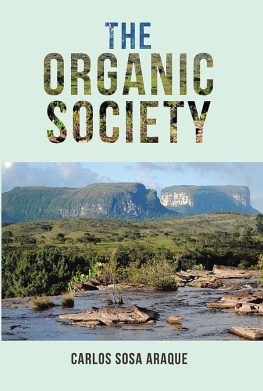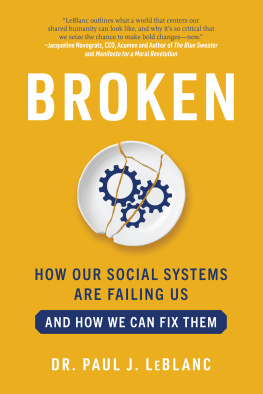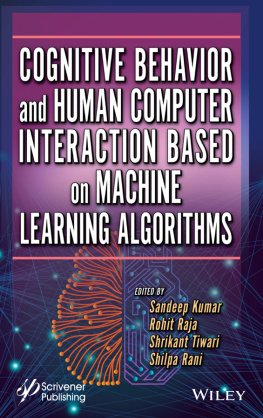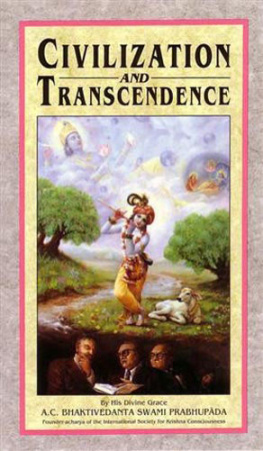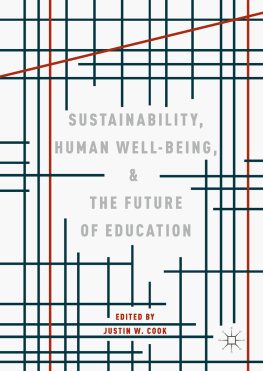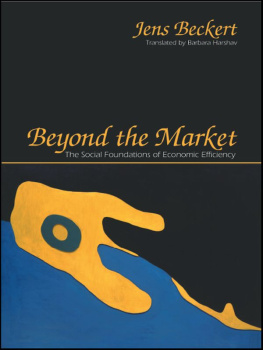The Organic Society
Carlos Sosa Araque
Copyright 2017 by Carlos Sosa Araque.
Library of Congress Control Number: 2017904566
ISBN: Hardcover 978-1-5065-1973-9
Softcover 978-1-5065-1972-2
eBook 978-1-5065-1971-5
All rights reserved. No part of this book may be reproduced or transmitted in any form or by any means, electronic or mechanical, including photocopying, recording, or by any information storage and retrieval system, without permission in writing from the copyright owner.
The views expressed in this work are solely those of the author and do not necessarily reflect the views of the publisher, and the publisher hereby disclaims any responsibility for them.
Rev. date: 30/03/2017
Palibrio
1663 Liberty Drive
Suite 200
Bloomington, IN 47403
Toll Free from the U.S.A 877.407.5847
Toll Free from Mexico 01.800.288.2243
Toll Free from Spain 900.866.949
From other International locations +1.812.671.9757
Fax: 01.812.355.1576
759810
CONTENTS
CHAPTER I
HUMANS BEHAVIOR AND HIGHER PRINCIPLE
CHAPTER 2
ORGANIC SYSTEMS
CHAPTER 3
THE ORGANIC SOCIETY
CHAPTER 4
THE ORGANIC STATE
4.THE EVOLVEMENT FROM THE MODERN STATE
TO THE ORGANIC STATE
CHAPTER 5
PROCESSES OF CHANGE
4.PROCESSES OF CHANGE: GRADUAL PROCESS
AND PROCESS VIA CRISIS
There is an old mistery in the univ erse:
Why life?
What is Creation for?
Intelects seek for and se arch
unsuccessf ully;
They invent theo ries,
but the ancient mys tery
only reveals itself to love,
to the consciousness illuminated by love.
A privilege of those who are simple and uncomplicated, like chil dren.
(Introduction to the Pergamin of the old K rato,
inhabitant of planet Kia, in Amy Returns by Enrique Bar rios)
DEDICATION
To Love,
That magnificent force that takes us by the hand
through mysterious paths of Life
Thanks to my family, Andreina, Alexander and Gabriela, for teaching me every day how to love and be loved.
Thanks to Paulo Reis for reading and providing his feedback many years ago.
Thanks to Melissa Navas for her assistance in proofreading the text.
Thanks to Fanny Hadjis for her support in translating the first pages.
Thanks to Leonardo Faccini for giving me the idea of translating this book.
Thanks to our spiritual guides for providing us with continuous support in the paths of life.
Modern institutions are characterized for having been designed under the mechanicist organizational model. Bureaucratic structures, hierarchies, the instrumental character of individuals, the organizations segmentation in multiple parts, the functionalist character of relationships among the parties, as well as the tailoring of means towards the achievement of objectives form part of a way of thinking inspired by the Cartesian rationality, and is expressed as the bureocratic-mechanicistic organization.
This type of structure exhibits a series of characteristics that prove ineffective for our current times, as is the lack of flexibility and proper adaptation to mutable environments. On the other hand, the bureocratic-mechanicistic structure shows implicit deficiencies to appropriately deal with the sources of motivation of man, in light of which several proposals have arisen throughout this century, inspired by theories of humane nature that seek to motivate man within the working environment. The results of these initiatives though, have led far from meeting the expectations created.
In parallel, Modern Society is determined by a rational economic system, based on the individualistic behavior of man, which determines and models social institutions, yielding thus as a result a great extent of material riches and technological progress, where the elements associated to equality and solidarity, however, are not properly incorporated into the economic systems. This induces a constant global economic growth without taking into consideratiom its viability in the long-term, obeying to facts such as the marginalization of large population sectors, the uneven distribution of riches, the extinguishment of resources, the unstable flow of speculative capitals, the alienation of individuals and the environments pollution.
Both the bureocratic-mechanicistic structure and the market system originate from the rational analysis of reality. Rationality, a symbol that belongs by excellence to the Modern Age, has reduced the analysis of society and mankind to the level of mechanical systems. The rational paradigm allows seeing reality as an inmense machine, leaving aside a series of factors inherent to their organic nature. All systems are treated as machines: the elements composing it are separated, analyzed and synthesized, failing to establish the difference between the set of elements functioning separatelly and the system as a whole.
Despite this reality, organizations, social systems and society in general can be seen from a different standpoint. These can be analyzed as a large quilt of overlapping relations, with additional priorities to the sum of its parts, where the conceptual metaphor are not machines but the organic structure, inspired by the natural organic systems. Organic structure is understood as the type of organizational and social structure based on the model provided by organic systems. In this type of structure, mans consciousness will play a paramount role, as his successful integration will depend on the harmonious behavior of the individuals forming part of this structure, and the permanent quest to achieve balance between the personal and collective wellbeing.
In addition, we deem necessary exploring other dimensions of human reality other than rationality, in order to accomplish our true purpose: the implementation of a type of organization that uses the organic metaphor as source of inspiration for a more harmonious social reality. To this end, we must resort to a series of factors inherent to the human nature, that reflect, in one way or another in the organizational reality, such as a sense of consciousness, solidarity and Love .
Seems quite paradoxical the fact that we must resort to rational arguments, through written words in this essay to introduce elements other than rationality to include additional factors that have an influence in the behavior of man. Love, consciousness, solidarity and other non-rational arguments can only be transmitted in rational terms thanks to the use of the written word, based on what they can project in the rational plane; even if we acknowledge that we will never be able to explain or depict accurately these facets of the human experience in rational terms. Using a graphic metaphor, just as the cube can only be explained in bi-dimensionality terms as a square, the same happens in trying to explain some non-rational aspects of life in rational terms in a text, through their projection in the rational plane and the use of language, with the inherent limitations implied therein. However, given the need to convey such arguments, we accept the use of language in order to try to explain that there is another kind of language that would allow us understanding better the human dimension. In some segments, this essay will be severe with the readers rationality, as non-rational dimensions are simpler and severe with rationality than many rational arguments, where each detail requires being addressed in detail to explain its real essence. Therefore, we will try to address ideas and concepts in a clear and precise manner so that these could be conveyed in a simpler and more profound way, using another kind of communication.
One of the main purposes of this work will be showing the need of surpassing the rational step entailing the analysis of reality and organizational and social relations in order to ascend towards the step of consciousness, where the human being recognizes him as an indivisible part integrated into a whole unified by essence.
Next page
